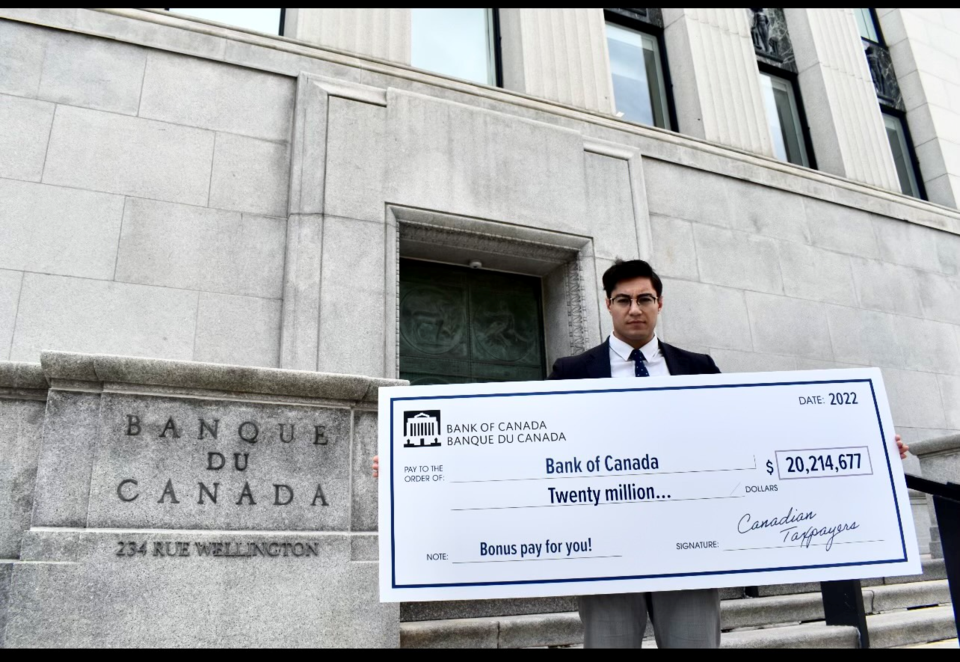Bank of Canada bureaucrats got $20 million in bonuses in 2022 while the Crown corporation hiked interest rates seven times and inflation reached a 40-year high.
“Bonuses are for people who do a good job, not people who fail at their one and only job,” Franco Terrazzano, Federal Director of the Canadian Taxpayers Federation, said. “Most organizations don’t shower employees with bonuses when they have their worst year in four decades.”
The average bonus among staff was $11,200, with 80 per cent of the workforce receiving one, according to internal government records obtained by the CTF through a series of access-to-information requests.
The Bank of Canada also dished out $6.5 million in raises in 2022.
Since the onset of the COVID-19 pandemic, the Bank of Canada rubberstamped nearly $72 million in bonuses and pay raises for staff.
Not a single Bank of Canada employee had their pay cut in 2020, 2021 or 2022.
The Bank of Canada’s mandate is to keep “an inflation target of two per cent inside a control range of one to three per cent.”
In November 2020, Bank of Canada Governor Tiff Macklem told the federal finance committee that “inflation is projected to remain less than two per cent into 2023.”
But inflation was 6.8 per cent in 2022, representing “a 40-year high, the largest increase since 1982,” according to Statistics Canada. Despite failing to meet its mandate, the Bank of Canada still handed out $26.7 million in bonuses and raises in 2022.
The Bank of Canada also failed to meet its inflation target in 2021 when it handed out $23.6 million in bonuses and raises. Only three industrialized countries had higher inflation rates than Canada in 2021, according to a January 2022 Fraser Institute report.
Macklem also told the committee the central bank expects to keep its interest rate at its “effective lower bound [of 0.25 per cent]” into 2023. However, it increased interest rates seven times in 2022. Its policy interest rate is currently five per cent.
In 2022, Macklem admitted “we got some things wrong” and the deputy governor acknowledged “we haven’t managed to keep inflation at our target,” adding that Canada’s central bankers “should be held accountable.”
“Handing out big bonus cheques is an odd way to hold your organization accountable,” Terrazzano said. “Central bankers shouldn’t get bonuses when Canadians can’t afford groceries, gasoline or homes.”
The number of Bank of Canada bureaucrats receiving six-figure salaries has also doubled since Prime Minister Justin Trudeau came to power, according to records obtained by the CTF through a separate access-to-information request.
In December 2015, a total of 487 Bank of Canada staff took home more than $100,000 annually, representing 30 per cent of its workforce.
In December 2022, 1,095 staff took home more than $100,000 annually, representing 49 per cent of the workforce.
There are now 309 more central bankers taking a six-figure salary than there were before the pandemic.
The Bank of Canada’s total labour costs increased by four per cent in 2022, 12 per cent in 2021 and 13 per cent in 2020, according to its annual reports.
“I would cancel bonuses for failing government authorities and that would include, for example, the Bank of Canada,” Pierre Poilievre on the Canadian Taxpayers Podcast. “I don’t think we should reward failure.”
In Budget 2023, the federal government said it plans to work with Crown corporations to “ensure they achieve comparable spending reductions, which would account for an estimated $1.3 billion over four years starting in 2024-25, and $450 million ongoing.”
“At best, the Bank of Canada failed to keep a lid on rising inflation and, at worst, it drove inflation higher by printing hundreds of billions of dollars out of thin air,” Terrazzano said. “Finance Minister Chrystia Freeland should find savings by ending bonuses at failing Crown corporations like the Bank of Canada.”




